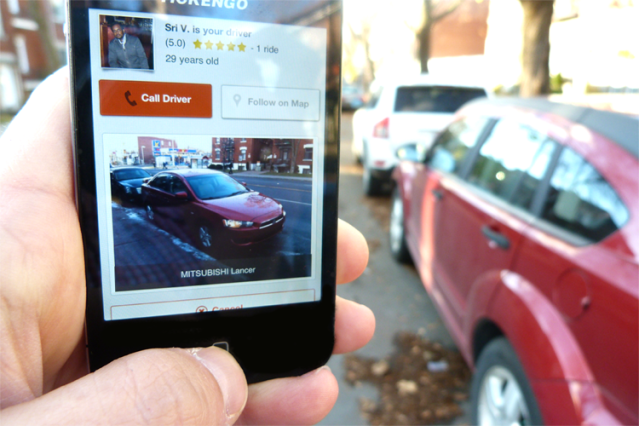Ride-sharing is becoming increasingly popular and more widely available, as San Francisco-based startups Lyft and SideCar have both begun expansion into new cities. But what if I told you there's a ride-sharing company that already operates in all the cities that those companies are just now starting to enter? The company is called Tickengo, and it claims thousands of drivers signed up in more than 900 cities.
Tickengo was incorporated in 2011 to reduce the friction between drivers and passengers who are going to the same place. But the company differentiates itself from other ride-sharing providers that have sprung up over the last year by providing a more open marketplace between drivers and passengers. Unlike Lyft and SideCar, Tickengo hasn't been recruiting and training drivers to work shifts driving around town. Instead, it allows users to sign up and accept rides at their convenience, without the friction of a middle man managing their routes.
In that way, the company sees itself as more of a pure peer-to-peer marketplace like Airbnb. In contrast, CEO Geoff Mathieux says the other so-called ride-sharing companies that are amassing fleets of drivers in various cities, providing background checks, and training them are just operating cheap taxi services.
With Tickengo, there's little barrier to entry if you want to be a driver — you simply need to create an account and list a car in good working condition. For a better chance of getting ride requests, drivers can verify various other pieces of information, like phone number, driver license and insurance info.
 Tickengo isn't doing background checks on its drivers like some other services, and that's by design. The idea is that the more it steps in to manage the driving force, the less it operates like a pure "ride share" service, and the more susceptible it is to regulatory scrutiny.
Tickengo isn't doing background checks on its drivers like some other services, and that's by design. The idea is that the more it steps in to manage the driving force, the less it operates like a pure "ride share" service, and the more susceptible it is to regulatory scrutiny.
"From the moment we start managing the drivers, we've gone past the threshold of allowing people to connect with each other," Mathieux said. "We don't discriminate against drivers. People voluntarily choose to sign up, and the best we can do is verify their info."
Because Tickengo lets anyone sign up, Mathieux says there's little difference between it and 511.org's RideMatch service, which allows users to request a list of carpool or rideshare partners. And because it's an open marketplace, he says Tickengo is a lot more like Airbnb than competing ride-share services that are managing fleets of drivers.
"We're closer to Airbnb than Lyft and SideCar. What they're doing is not a peer-to-peer experience, it's just hiring a cheap cab," Mathieux said.
But like Airbnb in the early days, there are plenty of people who have signed up but haven't actually used the service. This can make its stats a little misleading. While it claims more than 350 drivers in San Francisco, for instance, a very small number are actually verified or have given rides. Only 22 have given rides and just 18 are verified. Just five drivers are listed under both categories. The same is true for other cities.
That means if you're a Lyft or SideCar rider, you probably won't get the same kind of instant pickup that you'd expect from those services. There are no roving fleets of drivers, just those who choose to take a ride in their spare time. In that respect, Tickengo is probably best suited for pre-planned travel — like booking a ride to the airport ahead of time — as opposed to trying to find a driver to take you to that meeting in 10 minutes.
But if you're willing to wait, Tickengo rides can be priced at about half what they would be for a normal taxi ride. Passengers set their own prices for rides, but Tickengo provides a suggested fare. The first driver to accept basically gets the offered amount, and Tickengo takes a 15 percent service fee from their cut.
Tickengo has raised $270,000, including a seed round of funding in 2011 from Kima Ventures. The company has five employees, and has former San Francisco Mayor Willie Brown Jr. as its lawyer and an advisor.
No hay comentarios:
Publicar un comentario